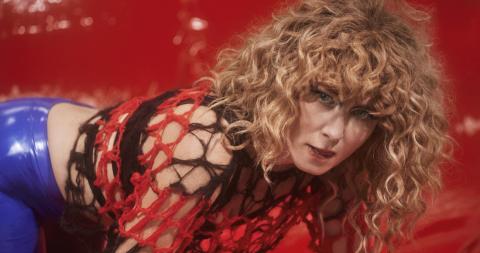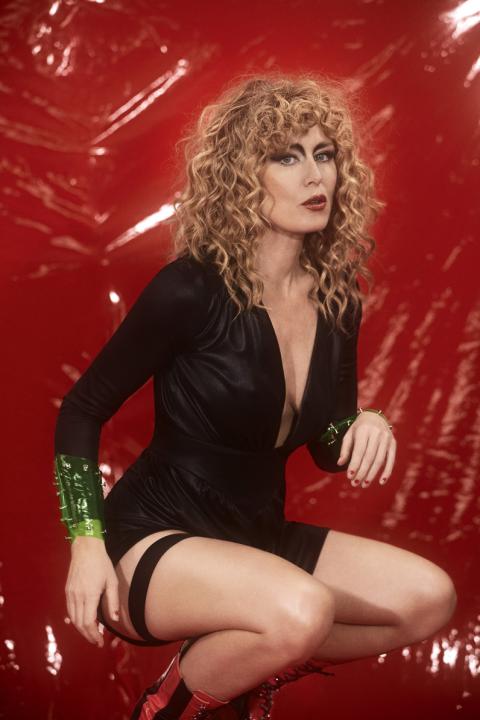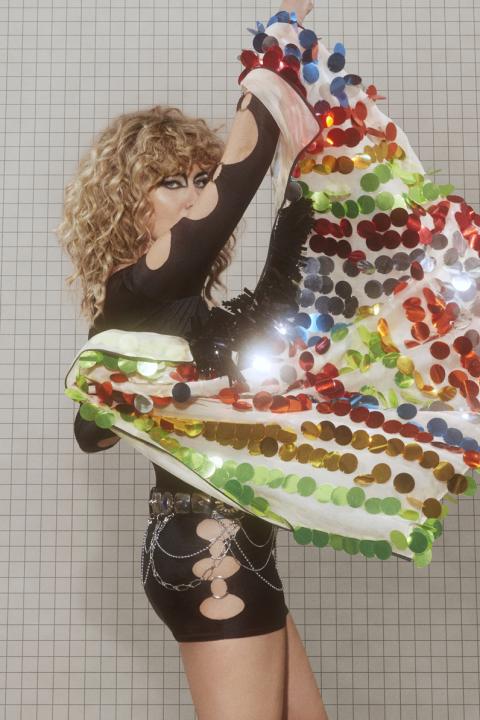Roisin Murphy talks new album Roisin Machine, solidifying her legacy and plans to retire from music

For an artist who has largely operated outside of the mainstream (the word ‘underrated’ has been attached to her for most of her career), it might feel at odds to some that in 2020 Roisin Murphy finds herself right in the thick of the current musical trend.
Her new album, the formidably-titled Roisin Machine, is a drama-filled disco record and arrives in throws of the genre’s revival currently being peddled by Dua Lipa, Purple Disco Machine, Jessie Ware and Kylie Minogue - though Roisin's take is less Donna Summer and more deep house.
As is often the case with Roisin, the perfect timing of the record release is entirely an accident. Far from a calculated move, Roisin Machine has been ten years in the making. She only knows this, Roisin tells us when we speak to her over the phone, because the album’s opening song Simulation was released around the same time as the birth of her daughter.
What’s more, disco – and it’s adjoining genres pop, house, electro – run deep in Murphy’s blood. She first went “proper clubbing” when she was 15. Her launch into music was as one half of Moloko, who hit the mainstream in 2000 with disco house bangers The Time Is Now and Sing It Back. Her solo records, even at their most experimental, have always been rooted in the musicianship of disco, house and electronica – particularly 2007’s Overpowered.
For our interview, she's speaking to us from clubbing mecca Ibiza – though it’s a “girls’ holiday”, she insists, and social distancing rules means there will be no hard partying on this occasion. “It’s more dinner parties, small gatherings, trekking, sailing and all those good things,” she says.
Between discussing her career and new album, Roisin regularly veers off topic to talk passionately about the more technical aspects of dance music - including how to re-wire speakers, the science behind mixing, the evolution of music technology, and the Jamaican sound system culture. They’re things she’s picked up from her years of traveling, partying and being mentored by some the industry’s finest; including Winston Hazel, Pipes and Richard Barratt (the latter produced and Roisin Machine). All three are DJ legends from Sheffield, the city where she discovered the joy of clubbing as a teenager.
At this point, the Roisin Machine is an almighty automaton.
----

Roisin Machine has been 10 years in the making; does the title mean it was a relentless, seemingly never-ending process that ultimately turned you into a cyborg?
It was the opposite really! It did start a very long time ago. The first song we made on this record Simulation was made 10 years ago. We just did drips and drabs over the years. Jealousy came out five or six years ago, and then Incapable really solidified the album. Crooked Man [Barratt], who produced the album with me, put Jealousy out without any names on it first, and it got a lot of reaction. We then signed to BMG/Skint through the most wonderful guy Damian [Harris], who ran Skint back in the day” (Harris returned as A&R Consultant of the label after a 12-year break).
MORE: Roisin Murphy's Official UK Chart history
What made you decide to sign with a larger label for this record?
“It was all Damian really. He’s probably the best A&R person I’ve ever worked with. BMG also have my publishing, so they’re probably quite interested in solidifying my legacy, and so am I, as it goes. It’s only for the one album - they wanted to sign me for more and I had to play a bit of hard ball and I wanted to keep my options open. It would take me quite a lot to get me away from them now, they’re so nice.
It’s hard to put out a record independently now – people expect a regular flow of content and you sort of have to play the game if you stand a chance of cutting through the noise.
That’s where the machine comes in. The Roisin Machine is in full effect on those levels because I do all the directing and the visuals. I have a very prolific output with or without being on a major label, which I think speaks well for me in this day and age.
Being a solo artist, I’ve got a pretty steady stream of really talented producers coming through my doors wanting to work with me. Every time you work with a new producer you go into a new world – you can almost reinvent yourself every time. You certainly learn so much more when each project is completely different – it’s not like seeing the same three or four band members year after year. That keeps what I do fresh. And I’m still looking good for an old bird as well. Wait until you see the [vinyl] gatefold, whew!
Is it a relief knowing all these songs you’ve worked on for the past decade now have a proper home?
They were all meant to be together initially anyway. After we put out Simulation, we backed off a bit because nothing really went off with it honestly. I got more interested in singing Italian songs, and then I went into making Hairless Toys and Take Her Up To Monto with Eddie Stevens. But this was always in the background – we always knew it would come to some kind of fruition, and so it has.
It wasn’t a difficult record to make because Barratt – who I’ve known all my musical life - is such a focused producer, it’s not a guessing game at all. He’s really like, ‘we’re doing this’, we aim for it and that’s what we achieve. That makes it very relaxing. Barratt can close his eyes and be in the middle of a club at 3am, even though he’s probably not stepped in a club for about 25 years!
As well as putting your faith in producers, do you also trust your own instincts better after 25 years in music?
I’ve always trusted my instincts because that’s all I’ve ever had. I didn’t have any training or anything – I don’t know how to tap dance and I wasn’t a singer when I started. Really it was always instinctual, and I always did what I wanted to, believe it or not – always! For right or for wrong I’ve followed my gut.”
Your years in music must also command a certain level of respect at this point?
I think that’s probably true-ish, yes. People are still a bit scared of me and scared of what I may bring and the trouble I may bring on them by being so demonstrative about what it is I want to do. There’s a respect but also a genuine fear I might f**k them up in the industry. That can work against you, being intimidating. I was talking to the girls here [in Ibiza] the other day when we were all on a boat snuggled up together and they were saying they don’t know why men find them intimidating. I said, ‘I know, it’s the same for me’. They all looked at me and shouted, ‘You are f**king intimidating!’.
The timing of this release is, seemingly by coincidence, timed perfectly for current disco revival. Does that feel strange for someone who usually operates outside of trends?
It does actually, yes! It’s particularly annoying to be shoved in with lots of other girl singers. I don’t feel like them. I feel like it comes out of clubbing all my life, since I was 15.
You know what, it’s nice to be on trend for once, though it’d be lovely if there were some f**king clubs open! I’d be murdering it; I’d be in every club going playing every remix – some of those remix packages Barratt is doing are stories unto themselves and it’d be lovely if they were in the clubs.
I think the album still works, though – there’s such a soulful, solid base to this record that it works outside of the club. Something More really works like that – it’s balearic, but it doesn’t have to be 9 O’clock in the morning after you’ve been raving, though that would be nice. It’s got a feeling you can play it in your garden, in your car, you can certainly exercise to it – there’s various ways you can absorb it. It’s seamlessly put together, but you can also listen to the tracks individually, I have no problem with that. I mean, it’s full of singles anyway. It’s very modern in a way.
You recently said that your current single Something More took on a new meaning and therefore a different sound because of the lockdown. Did it change the vibe of any other songs?
No because the record was more or less finished by that point. Something More was the last one we did, so it might have affected the dubs a bit. The concept for the album is a feeling that there is a proper album in there somewhere and that we’ve almost got a remix album here. You can create your own album out of it.
Another album highlight, Shellfish Mademoiselle, feels like a nod back to your early Moloko days.
It is a bit, isn’t it? That squelchy bassline. I don’t know, it might be a Sheffield thing, you’ll have to ask Barratt where that’s come from. Actually, the lyrics to that song are a bit from lockdown as well, ‘don’t stop me dancing…’ I wrote that chorus in lockdown.
Game Changer is probably my favourite on the album. It’s about creative relationships. Barratt’s a gamechanger. Anyone I work with, they change the game for me every time. Lovely things that they are!
Back in May, Alison Goldfrapp tweeted you that she’d just discovered your 2007 single Overpowered and loved it. It only took her 12 years, but it does prove how well your music stands up well over time.
“That was nice of her, wasn’t it? I can understand it, actually, because I’d be the same. I sort of don’t need to listen to Goldfrapp like I need to listen to things that are much more outside of my realm. It’s not that I don’t think it’s going to be good, like me she probably thought she doesn’t need to listen that. Things that are very close to what you do, why would you jump to it straight away?

What’s happened to Demon Lover?
“I mean… now I’m frightened to put it out. I really mean that. The current version is so pop that if it doesn’t get played on 1xtra or something then it’s a massive failure. I don’t know where it’s going to fit. It won’t be on the next album proper that I’m doing because that’s with DJ Koze and that’s a totally different thing. Demon Lover was with Seiji who wrote a lot of Overpowered with me. I was talking about doing a DJ Kicks album and putting it on in the middle of that.
It’s scheduling things though, isn’t it? I’ve got another project after the next album, which is a reggae thing. I don’t know, it might just have to stay mythical, sorry! Something that feels extremely mainstream does date, so you have to keep reworking it. Maybe when I’m 75 I’ll put it out. It’s such a good song, so we’ll see.
Do you think you’ll still be putting out records when you’re 75?
People ask me all the time, can you do a tune with us, and I can – I can go into the studio and record it - but I’ll never have a minute in my schedule that you can put it out. I’m jammed up. When I’m in my fifties I want to do film. I want to move away from music at that point. Not totally away, but I want to concentrate on getting a feature film together.
In the meantime, the next album is almost ready. A week in the studio with and it’ll be done, promise.
It looks like the clubs are going to be closed for a while longer yet; where would you go out dancing tonight if you could?
Paradise Garage is my ultimate club. I’ve dancing around clubs since I was a young teenager. I’ve always been someone who knows the DJ, really. I love having somewhere to put my bags – I don’t hang around them though, I’m out there on the floor making it happen. I have a job to do when I go to the club. I know it’s meant to be fun, but sometimes for me, clubbing is a serious business, you know?
Roisin Machine is released on October 2.
Join the conversation by joining the Official Charts community and dropping comment.
Already registered?
Log in
No account?
Register
yannis tjanetis
A huge Roisin fan but this album is NEXT LEVEL BRILLIANT.